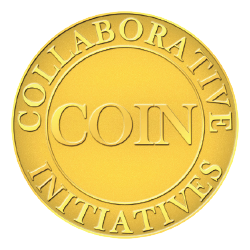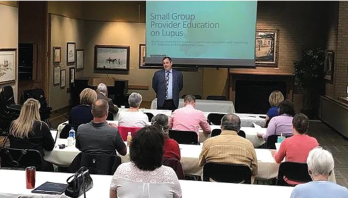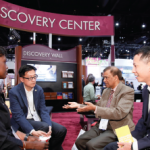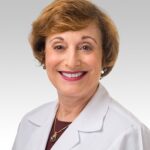
Two of the ACR’s Collaborative Initiatives (COIN) programs share a goal: to educate non-rheumatologist providers about systemic lupus erythematosus (SLE) symptoms to facilitate referrals, accurate diagnosis and therapy.
Small Group Provider Sessions
Launched in 2016, Small Group Provider Sessions provide lupus education while connecting frontline providers to a local rheumatologist in often underserved areas. The rheumatologist leads these two-hour sessions for 10 to 20 providers. They cover lupus risk, symptoms, diagnosis and therapy options. Each session closes with a talk from someone living with lupus, including a personal account of diagnosis, treatment and daily life with the disease. Small group sessions are typically held in rural areas, coordinated by local Area Health Education Centers (AHECs), with support from the National AHEC Organization (NAO).
“We are trying to raise awareness of lupus, including who is most at risk, because many people believe it’s not a very common disease. But in some populations, it’s much more prevalent, which should be taken into consideration,” says Robin Campbell, senior specialist and COIN project manager. The program has two goals: to connect frontline providers with a nearby rheumatologist for consultations and, ideally, referrals, and to “bring home the message” that prompt referral, accurate diagnosis and early treatment can positively impact patients’ health and quality of life. “We want these sessions to go beyond sharing information, but to build that connection between providers and the rheumatologist, to allow for better coordination of care,” says Ms. Campbell.
The ACR created the PowerPoint presentation for these sessions, and the local AHEC recruits the rheumatologist, promotes the session to local providers and hosts the event. In three years, 20 sessions have been held around the U.S. The ACR pays for the AHEC’s services and materials development with funding from a cooperative agreement with the Centers for Disease Control and Prevention.
Madelaine Feldman, MD, a rheumatologist who leads small group sessions, including one in September in Bogalusa, La., says there is a great need for lupus education among primary-care providers in rural communities. Internal and family medicine training programs often provide very little rheumatology education and even less on lupus diagnosis and screening, she says.
“In speaking with nurse practitioners, physician assistants and nurses who attend clinics in these areas, I can see that their knowledge of lupus is little to none. And even with residents that I spoke to a couple of years ago, I could see that this program was extremely helpful for them. I view the program as successful, and I wish that it could be more widespread,” she says.
Teaching Fellows in Lupus

Centennial AHEC in Sterling, Colo., coordinated a small group session in May, at which Daniel Muller, MD, PhD (not pictured), was the presenter.
The Teaching Fellows in Lupus Project provides a vivid example of how ACR members can see their ideas come to life. Amanda Sammut, MD, assistant clinical professor of medicine at Columbia University Division of Rheumatology, came up with the idea of utilizing fellows to educate non-rheumatologists about lupus and in 2015 the ACR helped that idea come to life. The project began in 2015 as a collaborative effort between the ACR and the Lupus Research Institute, now known as the Lupus Research Alliance. ACR members representing the University of California San Francisco, Northwestern University, Emory University and Harlem Hospital Center were the first to work with participating rheumatology fellows who were trained to educate frontline providers about lupus using a standardized presentation created by the ACR.
“It has evolved into making the Teaching Fellows in Lupus program a standard for COIN, and we’ve had great participation and interest from fellows and their program directors around the country,” says Sherry J. Williams, COIN consultant. “We are trying to increase the level of knowledge of these frontline providers in order to increase the diagnosis of lupus.”
At these sessions, fellows discuss the presenting signs and symptoms of lupus, when to refer a suspected lupus case to a rheumatologist, how to initiate a lupus workup, and general information on lupus epidemiology, health disparities among populations affected by lupus, and genetics. Fellows are also responsible for recruiting local providers. Sessions attract anywhere from three to more than 30 attendees. Six fellows are participating this year from four programs: University of Alabama Birmingham, Saint Louis University, the University of Chicago and the University of Ottawa. In 2018, the program held its first virtual online training session for 92 participants.
“This program gives our fellows an opportunity to learn more about lupus as well, and how to work with frontline providers, because as rheumatologists, they will be doing that,” says Ms. Williams. “They also get a chance to hone their presentation skills.”
Ms. Williams and a COIN staff member, L. Beaman Morris, review program directors’ feedback about the project, which they say has been very positive so far. One fellow from the program will be selected, based on directors’ nominations, to deliver the educational presentation at a Program Directors Forum at the 2018 ACR/ARHP Annual Meeting in Chicago.
COIN staff is trying to evaluate the program’s outcomes, including measuring the change in lupus awareness and any increase in the recognition of the lupus diagnosis process, according to Ms. Williams. “One new thing we did this year was to focus on more than just the signs and symptoms of lupus, but the impact of lupus on a patient’s life,” she says. Fellows help local providers appreciate the importance of treatment for the patient’s quality of life.
Dr. Sammut has observed teaching fellows programs held at New York City Health + Hospitals/Harlem. She feels that because of these sessions, early recognition of SLE by the attendees improved.
“The fellows become more confident educators also, and they see how much is not known about SLE among other healthcare providers,” says Dr. Sammut, a former site director at New York City Health + Hospitals/Harlem. “Providers have someone to discuss SLE with and can refresh their knowledge about the disease. Most importantly, this educational program usually helps connect rheumatologists to other providers to improve access to care.”
Program materials are available free online. As long as funding continues, three to four rheumatology fellowship programs will be selected to participate each year, says Ms. Williams.
For more information about these programs, contact the ACR’s COIN department at [email protected].
Susan Bernstein is a freelance medical journalist based in Atlanta.


